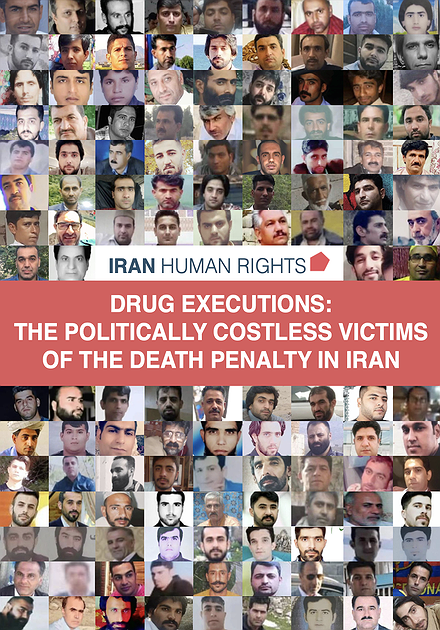Drug Executions: the Politically Costless Victims of the Death Penalty in Iran
“Death Penalty: an Irreversible Torture” is the theme of the 21st World Day Against the Death Penalty. To mark the occasion, Iran Human Rights is highlighting the use of the death penalty in the name of the “war on drugs” which has claimed at least 3,990 lives in Iran since 2010. In fact, in the last 14 years (2010-10 October 2023), more people have been executed for drug-related charges than any other death penalty charges in Iran. Of the 7530 executions recorded by IHRNGO since 2010, 53% were for drug-related charges.
Under the jurisdiction of the notorious Revolutionary Courts also responsible for political executions, drug defendants are systematically tortured to force confessions, denied access to lawyers and tried in sham trials without due process. Those executed for drug-related charges are from the most marginalised and impoverished communities. The death penalty is a tool of political repression and voiceless drug defendants are cannon fodder used as its ammunition. They are the politically low cost victims whose secret group hangings barely make news.
While drug execution numbers dropped to an average of 26 per annum following an Amendment to Anti-Narcotic Laws due to international pressure in 2017, they reversed in practice in 2021 and have continued to rise with at least 305 drug executions recorded in 2023 as of 10 October. In 2023, drug executions outnumber all other charges once again. Globally, Iran remains the world’s top executioner for drug offences. Of the 285 drug executions recorded in 2022 by Harm Reduction International worldwide, 98.4% took place in Iran.
However, the international community at large, has remained silent about this exponential rise. In publishing this report, Iran Human Rights urges Member States to withdraw funding of UNODC projects on drug-trafficking in Iran, and to make all collaborations and funding contingent upon an immediate halt to all drug-related executions.
Director, Mahmood Amiry-Moghaddam said: “Islamic Republic authorities have repeatedly admitted that the death penalty doesn’t deter drug trafficking. Yet, they continue to carry out executions because they need to instil societal fear to prevent more protests. Those executed for drug charges are among the most marginalised groups in society and the low-cost victims of the regime’s killing machine.” He added: “The Islamic Republic authorities use the UNODC cooperation to legitimise the drug-related executions. The UN must not allow one of its agencies to be complicit in what is regarded as serious human rights violations according to the international law."
Facts and Figures
- At least 3,990 people were executed for drug-related charges between 2010-10 October 2023
- At least 766 people have been executed for drug-related charges since the 2017 Amendment to the Anti-Narcotics Laws.
- Only 3% of drug executions recorded by IHRNGO since the 2017 Amendment were announced by official sources compared to 20% for all executions.
- At least 8 juvenile offenders have been executed for drug-related charges since 2010
- At least 94 women have been executed for drug-related charges since 2010
- At least 274 Baluch people have been executed for drug-related charges since 2021, 40% of all drug executions in that time period. This is while they only make up 2-5% of Iran’s population.
Read the full report:


